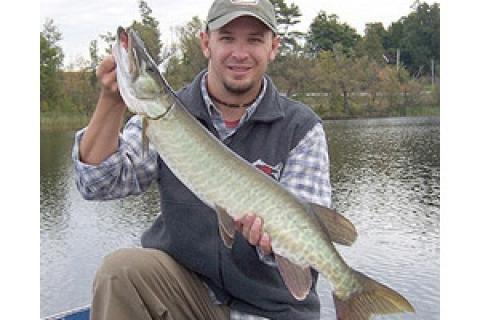
 |
| When the water erupts in a shower of spray, there really is no better feeling to be found in this wonderful sport we call angling. |
In the angling world, fishing the mighty musky reigns supreme, conjuring up images of razor-sharp teeth, truly immense size and extraordinary power. For the avid anglers who are part of the musky fraternity, fishing for these giants has become an obsessive trait that has literally turned into a way of life.
Although muskies can be caught with a variety of fishing lures and techniques, nothing can quite match the sheer excitement and thrill of utilizing a surface presentation. Playing a well- orchestrated game of "cat and mouse" makes for an interesting and productive time on the lake and, when the water erupts in a shower of spray, there really is no better feeling to be found in this wonderful sport we call angling.
Finding the Right Fishing Location is Everything
When it comes to fishing topwater baits for muskies, one specific location is always part of the equation and that is shallow water, from the shoreline out to about 12-feet deep. Of course, not all shallow water is created equal. You can, however, significantly increase your chance of success by targeting specific areas within the
skinny zone.
Vegetation-rich bays, points, shallow reefs and distinct weedlines are great starting spots but, to up the odds ever further, concentrate your fishing on anything that appears different in comparison to the surrounding area.
Transitions from weeds to sand or rock, pebble and boulder combinations, isolated cattails and logs and stumps and fallen trees are all prime examples of something out of the ordinary that will hold fish.
The weeds that you fish should be green and healthy, with clumps, pockets and distinct edges present in order to attract muskies. These fish are ambush feeders, so look for them to hold on the inside or outside edge of the salad, waiting for anything edible to swim by.
Pay particular attention to areas that have nearby access to deeper water. Muskies will wander back and forth between deep and shallow, using the shallows as feeding areas and the deeper spots for resting.
Water Temperature & Timing is Key to Fishing Success
Although topwater fishing for muskies can be effective during both warm and cold-water periods, the technique is most effective when water temperatures are above 58-degrees F.
As water temperatures climb, so does a muskie's metabolism, making it more likely to be aggressive and willing to bust a bait on the surface.
 |
| Topwater baits come in a variety of shapes, sizes and colors, with each possessing a specific trait to trigger strikes. |
One of the best indications that a midday surface bite might happen is when warm temperatures and overcast skies are accompanied by southwesterly winds, generally a sign of an approaching front. For whatever reason, this combination really seems to stir up a musky's activity level. In shallow, fertile lakes concentrate on large expansive bays during this peak time, drifting with the wind and covering as much water as possible.On deeper shield lakes, head to wind-blown points or islands to cash in on this feeding spree.
Fishing the graveyard shift is another productive time to be out on the water. Boat traffic will be non-existent, and the lake will truly become yours - except for sharing it with the odd pesky mosquito!
I prefer to frequent many of my daytime haunts during the night, and have found that both rock and weed locations will produce well. Sandy beaches and swimming areas have also accounted for some big fish over the years, so don't overlook these high-percentage areas when out in the dark.
Tools of the Trade
Topwater baits come in a large variety of shapes, sizes and colors, each possessing specific traits to trigger strikes. Whether it is buzz blades, props or spiraling bodies, getting your lure to produce an audible sound is the key to getting your pole bent.
By selecting a few baits that generate different sounds, have varying actions and work differently at various speeds, you will discover the subtleties that will cause a musky to strike. Before long, ascertaining which lures produce best will undoubtedly lead you to your very own "go-to" bait.
- 5953 views

